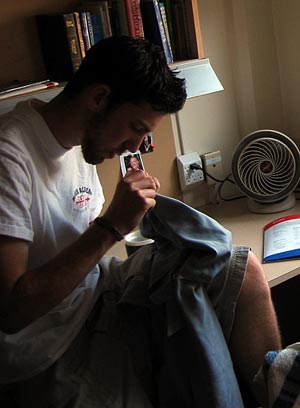March 2008
Teach your Children Well
by Annie Fox, M.Ed

I do a fair amount of parent education seminars. There were five of them last month. For those of you who’ve been to one, you’d probably agree that my presentation style is pretty casual. But while it may look like all I’m doing is reading teen email from the likes of “Invisible Loser” and “Stuck and Lonely,” plus sharing war stories about discovering our daughter on the phone with her boyfriend at 2:37 AM (on a school night!) and morphing into Godzilla in the doorway of our son’s absurdly cluttered room… I actually prepare for every workshop. Seriously. I’m a teacher. Post-its and educational objectives and are in my DNA.
All parents are teachers. At 18 your kids will graduate from your private school of child development. No diploma, true, but they’re definitely racing off into the world with a bunch of lessons learned… from you.
 What, precisely, does your exit exam measure? If you’re not sure, you’re not alone. In the first 5 years, parents have a packed curriculum for their little ones to master (walking, talking, potty training, toy sharing, nose-blowing, etc.). But beyond 1st or 2nd grade, parenting objectives start getting fuzzy. As parents of teens, your days of close-at-hand parenting are numbered. So if you are a bit unclear about some of your parenting goals, maybe I can help.
What, precisely, does your exit exam measure? If you’re not sure, you’re not alone. In the first 5 years, parents have a packed curriculum for their little ones to master (walking, talking, potty training, toy sharing, nose-blowing, etc.). But beyond 1st or 2nd grade, parenting objectives start getting fuzzy. As parents of teens, your days of close-at-hand parenting are numbered. So if you are a bit unclear about some of your parenting goals, maybe I can help.
Here’s a question I often ask at my workshops: What are your top 5 parenting objectives? In other words, by the time your kid goes off to college what kind of person would you like him/her to be? Usual responses:
|
|
It’s a great starter list. And as my workshop participants share their objectives with the group, I can tell by the nods and smiles that the thoughtful parents in the room feel really good about the goals they’ve set for their children.

Current trends in education hold teachers more and more accountable for student achievement or the lack thereof. And of course, there’s a connection. Doubtless you can recall one or more teachers who encouraged and inspired you or your kids to reach new creative, academic, or athletic levels. And conversely, when teachers are unmotivated, students can develop poor attitudes and their progress and self-esteem may suffer.
Listing goals is obviously easier than working to achieve them, so here’s my next question: “What are you consciously doing, every day, to support the development of the skills and character traits you say you want for your kids?” I realize that’s a tough one because we all know how busy we are. But if you buy the premise that parents are teachers and have some accountability for the young adults they’re graduating into the world, then an ongoing parenting plan is definitely in order. So, Teacher, you’ve got to a) figure out what your plan is and b) put it into action. How else will your kids get to the place you say you want them to reach by the time their packing for college?
 Discussing a game plan often gives parents pause because most of us don’t usually think about parenting in such concrete ways. But if you’ve got no active game plan, then, with all due respect, your parenting objectives are little more than a well-meaning mission statement on a school website. Granted, raising kids is an art and not a science, but still, if you’ve got things you want them to learn from you, then you have to teach them.
Discussing a game plan often gives parents pause because most of us don’t usually think about parenting in such concrete ways. But if you’ve got no active game plan, then, with all due respect, your parenting objectives are little more than a well-meaning mission statement on a school website. Granted, raising kids is an art and not a science, but still, if you’ve got things you want them to learn from you, then you have to teach them.
Now here’s my final question for today: “What might you be doing (consciously or unconsciously) to undermine your own stated objectives?” Maybe you say that you want your child to be self-sufficient, but are you’re still dragging your 15 year old out of bed every morning, making him lunch, and checking his homework? Maybe you say you want your 14 year old to be self-confident, but do you also tell her that she’s lazy, rude, self-centered, and can’t do anything right?
Perhaps it’s your goal for your kids to be skilled and thoughtful decision makers. That’s great, but might you be missing opportunities to praise their good judgment when they use it? On the flip side, are you consistently helping them de-construct and learn from their less than stellar decisions?
You get the idea. You need to be aware of your parenting objectives and you need to be the kind of teacher that supports your own curriculum every single day. One other thing to keep in mind, if you’re not personally modeling what you teach, then you’re teaching something else. If, for example, you demand that your children treat you (and others) with respect then you speak rudely to waiters, cashiers, etc. well, suffice it to say that your kids are watching and learning.
Class dismissed. See you next month.
In friendship,
Annie
















